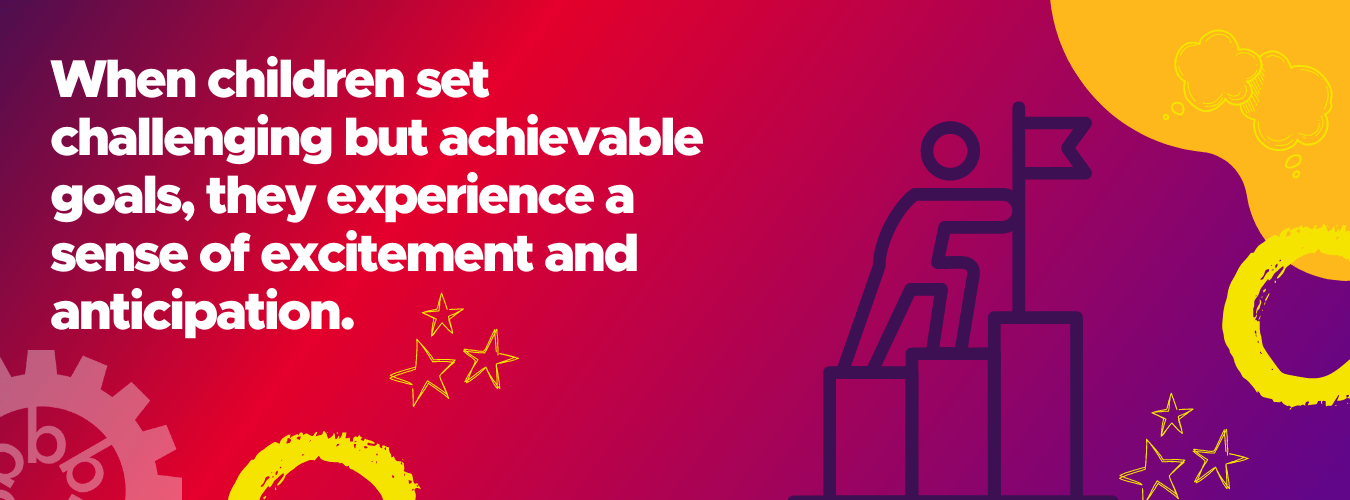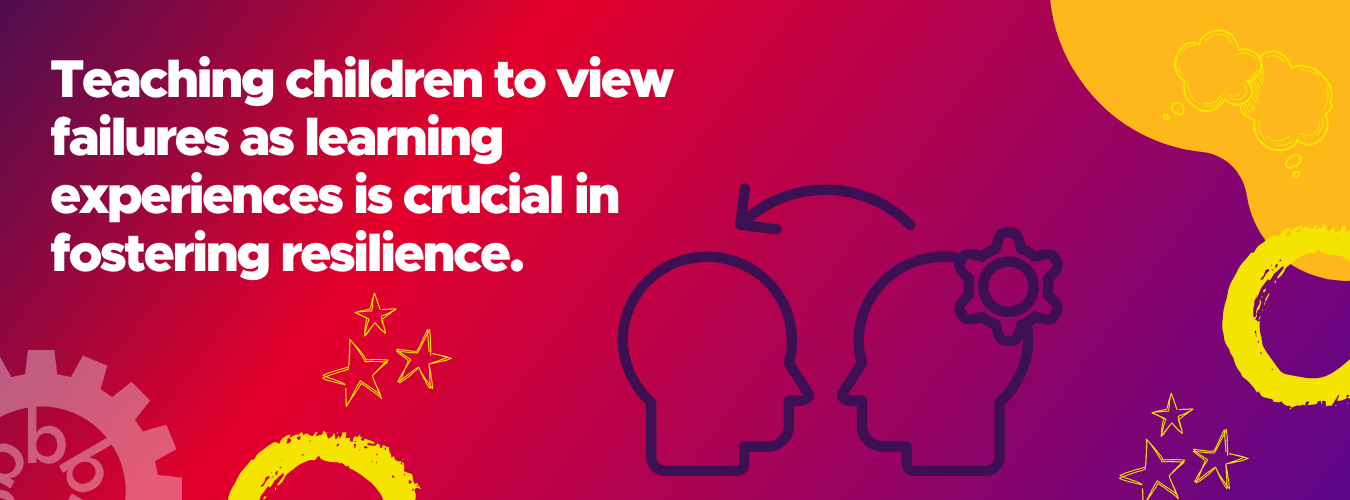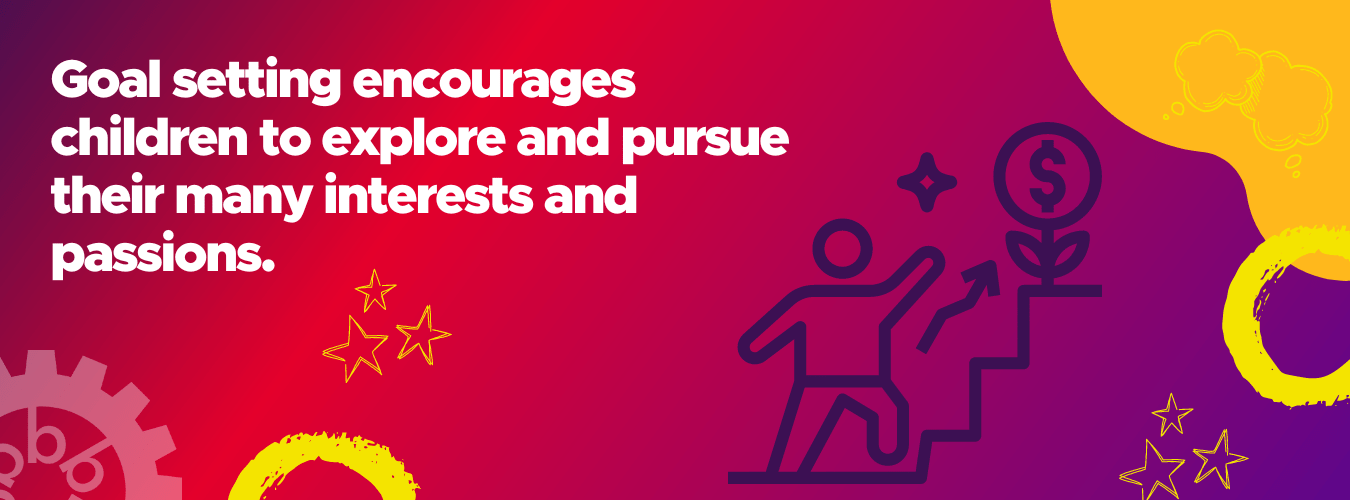Benefits of Goal Setting

Goal-setting is an essential ingredient in achieving success, and introducing this valuable tool to children can yield tremendous benefits. It plays a crucial role in a child's learning, achievement, and overall development. Goals provide direction and purpose, empowering children to stay on track and exceed their expectations.
When children learn to set goals, they gain the ability to visualise their aspirations and plan the necessary steps to achieve them. This process not only motivates them but also builds lifelong skills.
This blog outlines the many benefits and importance of goal setting for children and tips on how you can help your child set and stay on track with their goals.
Is your child struggling to keep up with schoolwork? Are they falling behind? Are they bored in class? Or are you looking for extension work for your child? Check out our eBook to learn more about how we help your child improve academically and build confidence through our in-centre after-school tuition.
Direction and Vision
Setting goals helps children understand and develop a sense of direction and envision their future. Whether it's acing a challenging maths exam, mastering a musical instrument, or excelling in sports, articulating their ambitions helps them create a clear vision and roadmap guiding their efforts and actions.
As parents, encourage children to talk about their goals and aspirations. By actively listening to and supporting their dreams, we foster a sense of confidence and belief in their abilities. Additionally, having open conversations about the paths needed to reach their goals helps children understand that success often involves perseverance and hard work.

Focus and Prioritisation
In today's distraction-filled world, cultivating focus is a precious skill. Goal-setting plays a crucial role in helping children stay focused on what truly matters to them. By goal setting with clear, specific, measurable, achievable, relevant, and time-based objectives, children learn to prioritise and manage their tasks and their time effectively.
For instance, if a child's long-term goal is to become a skilled netball player, they may prioritise daily practice sessions over other less relevant activities like arts and crafts. Through this process, children learn the value of discipline and how to make conscious choices that align with their goals.
Motivation and Persistence
Goals are powerful motivators that ignite children's passion and enthusiasm for learning. When children set challenging yet achievable goals, they experience a sense of excitement. Each step towards their goals, no matter how small, fuels their energy, excitement and motivation, reinforcing the importance of their commitment.
As parents, we play a crucial role in supporting children's motivation. By acknowledging their progress and celebrating their achievements, we help to motivate and build a positive and nurturing environment that encourages continuous effort and perseverance.

Increased Confidence and Self-Efficacy
Achieving goals, even the smallest ones, contributes significantly to a child's confidence and self-efficacy. Every milestone reached and obstacle overcome strengthens their belief in their capabilities. As children witness their progress and achieve more, they develop a deep-rooted sense of self-confidence, knowing that they can face any challenge and succeed.
While aiming high is commendable, setting unattainable objectives may lead them to feel frustrated and discouraged. By working together to set goals that challenge but don't overwhelm, we empower children to recognise their potential and ability.

Personal Growth and Resilience
Setting and pursuing goals provide invaluable opportunities for personal growth and resilience. Children learn that success in the world is often a journey filled with ups and downs. As they encounter obstacles and setbacks, they develop the resilience to bounce back, adapt, and keep moving forward.
Teaching children to view failures as learning experiences is crucial in fostering resilience. When they understand that setbacks are a natural part of the growth process, they become more willing to take risks and embrace new challenges.

Building Positive Habits
Goal setting can act as a catalyst for building positive habits in children. As they work towards their goals, they naturally develop habits and routines that support their objectives. For example, a child striving to improve their English skills may establish a daily practice of reading or writing.
Consistency is key when building positive habits. By creating a supportive environment and offering gentle reminders, we can help children stay committed to their habits and make progress towards their goals. Over time, these habits become ingrained, fostering lifelong skills that extend far beyond achieving a single goal.
Encouraging Interests and Passions
Goal setting encourages children to explore and pursue their interests and passions. As children identify what excites them and what they're genuinely passionate about, they gain a sense of purpose and fulfilment.
By nurturing their interests, we empower children to develop a well-rounded and enriched life, brimming with activities that bring them joy and personal satisfaction.
As parents, it's essential to expose children to a diverse range of activities and opportunities, allowing them to explore and discover their passions. As they express interest in specific hobbies or subjects, we can support their exploration and provide the resources they need to develop their skills further.

Incorporating Goal Setting into Education
In educational settings, the goal-setting process can be integrated into various aspects of a child's learning journey. Teachers can encourage students to set academic goals at the beginning of the school year or each term.
By regularly reviewing and reflecting on their progress, students can continuously adapt and refine their goals, ensuring they remain relevant and achievable.
Supporting Children's Goal Setting
As adults, we play a critical role in supporting children's goal-setting endeavours. Here are some tips to help children set clear goals, have enough resources to achieve them and stay on track with their goals:
- Empower children to take control of their growth. Foster independence by letting them make decisions and choices that contribute to their goal-setting journey.
- Emphasise progress over perfection. Teach them that incremental growth and learning are more valuable than achieving flawlessness.
- Teach children to be adaptable. If circumstances change or they encounter unexpected challenges, encourage them to pivot and adjust their goals or strategies accordingly.
- Recognise that each child is unique. Tailor your support to their personality, strengths, and preferences. Respect their choices and provide guidance that aligns with their character.
- Stay engaged and attentive to their progress. Ask about their goals regularly and provide a listening ear for their successes, challenges, and evolving aspirations.
- Celebrate the effort they put into working towards their goals, not just the outcomes. This reinforces the importance of persistence and dedication.
Goal setting is a powerful tool that empowers children to reach their full potential. By supporting them in this process, we help them develop essential skills, resilience, and confidence needed for a successful and fulfilling life.
If your child has found a passion or a weak spot that they wish to improve, it's important to assist them in creating goals to support their growth in that area.
NumberWorks’nWords tutoring is dedicated to building children's confidence and enhancing their academic performance in maths and English.
Our customised tutoring programs and courses are tailored to each student's specific learning goals and level, and we take pride in helping children overcome knowledge gaps, boost their confidence, and enhance their maths and English abilities. Contact us today to learn more about our tuition services and courses, and book a free assessment to get started!




